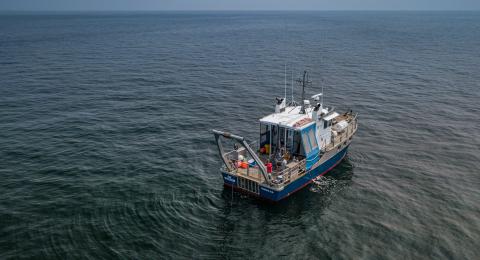What is marine policy?
Marine policy (also referred to as coastal or ocean policy) is a field of study and practice focused on public policy and governance as it relates to marine, ocean, and coastal resources. Effective management of human activities in ocean, coastal, and Great Lakes areas is critical to our future,which includes the setting of public policy as it relates to these systems.Combine this minor with a major such as ocean engineering, biology, wildlife conservation, environmental conservation and sustainability, political science, or others to enhance your career opportunities or prepare for graduate study in science, management, law, or policy.
Why study marine policy at UNH?
Students at UNH have access to world-class, state-of-the-art marine and coastal research facilities and platforms with hands-on learning opportunities through the School of Marine Science and Ocean Engineering, coupled with extensive partner networks with federal, state, and local governments. Located in the New Hampshire Seacoast region, UNH is the perfect place to study marine policy. Through pertinent coursework and internship opportunities, students are able to gain exceptional experience in marine science and policy.
Potential career areas
- Natural resource management
- Non-profit science policy and advocacy
- Government scientist/researcher (federal/state)
- University teaching/research
- Environmental consulting
- Environmental law
- Maritime law and policy
- Marine technology development
- Marine renewable energy development
- Sustainable fisheries and aquaculture
- Coastal zone management
Curriculum & Requirements
Marine policy (also referred to as coastal or ocean policy) is a field of study and practice focused on public policy and governance as it relates to marine, ocean, and coastal resources. Effective management of human activities in ocean, coastal, and Great Lakes areas is critical to our future, which includes the setting of public policy as it relates to these systems. Combine this minor with a major such as ocean engineering, biology, wildlife conservation, environmental conservation and sustainability, political science, or others to enhance your career opportunities or prepare for graduate study in science, management, law, or policy.
For more information contact Professor, Gregg Moore, (603)862-5138.
Academic policies related to Minors.
- The minor requires five courses for a total of 20 credits.
- Minimum of C- grade earned in each course.
- No more than 8 credits in the Major can be counted toward the minor.
| Code | Title | Credits |
|---|---|---|
| Required Courses | ||
| MARI 705 | Introduction to Marine Policy: Understanding US Ocean, Coastal and Great Lakes Policy | 3 |
| Electives | ||
| Select two courses from the following: | ||
| CEE 520 | Environmental Pollution and Protection: A Global Context | 4 |
| CEE 705 | Introduction to Sustainable Engineering | 3 |
| MEFB 702 | Sustainable Marine Fisheries | 4 |
| NR 437 | Principles of Sustainability | 4 |
| NR 602 | Natural Resources and Environmental Policy | 4 |
| NR 720 | International Environmental Politics and Policies for the 21st Century | 4 |
| NR 754 | Critical Issues in Sustainability: Sense of Place | 2 |
| NR 786 | Leadership for Sustainability | 4 |
| PHIL 450 | Environmental Ethics | 4 |
| NUTR 730 | From Seed to Sea: Examining Sustainable Food Systems | 4 |
| POLT 444 | Politics and Policy in a Warming World | 4 |
| Select at least one course from the following: | ||
| ESCI 501 | Introduction to Oceanography | 4 |
| ESCI 502 | Beaches and Coasts | 4 |
| MEFB 503 | Introduction to Marine Biology | 4 |
| MEFB 535 | Marine Mammal Biology | 4 |
| MEFB 590 | Coastlines in Crisis | 4 |
| MEFB 674 | Ecology and Marine Environment | 4 |
| MEFB 725 | Marine Ecology | 4 |
| Additional approved courses: | ||
| ME 706 | Renewable Energy: Physical and Engineering Principles | 3 |
| NR 403 | Introduction to Environmental Science | 4 |
| NR 435 | Contemporary Conservation Issues and Environmental Awareness | 4 |
| NR 784 | Sustainable Living - Global Perspectives | 4 |
| NR 785 | Systems Thinking for Sustainable Solutions | 4 |
| NR 795 | Investigations | 1-4 |
| POLT 751 | Comparative Environmental Politics and Policy | 4 |
| SOC 565 | Environment and Society | 4 |
| SOC 665 | Environmental Sociology | 4 |
